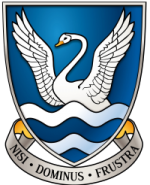 German
German
Aims
- To derive enjoyment and benefit from language learning and be inspired by following a broad, coherent and worthwhile course of study.
- To understand and respond to spoken and written language from a variety of authentic sources.
- To speak with increasing confidence, fluency and spontaneity, finding ways of communicating what to say, including through discussion and asking questions, and continually improving the accuracy in pronunciation and intonation.
- To be able to write at varying length, for different purposes and audiences, using the variety of grammatical structures learned in class.
- To discover and develop an appreciation of a range of writing in German.
- To develop an awareness and understanding of German-speaking countries and communities.
- To help pupils recognise that their linguistic knowledge, understanding and skills provide them with a suitable basis for further learning opportunities and opportunities for career progression.
- To nurture individual creativity and encourage independent thinking.
- To encourage pupils to appreciate the benefits of working with others in teams.
- To provide pupils with opportunities to evaluate their own work and the work of others.
Staffing
Mrs Acheson
Mrs Bower
Subject Overview
Learning a foreign language is a liberation from insularity and provides an opening to other cultures. A high-quality education in languages should foster pupils’ curiosity and deepen their understanding of the world. The teaching enables pupils to express their ideas and thoughts in another language and to understand and respond to its speakers, both in speech and in writing. It also provides opportunities for them to communicate for practical purposes, learn new ways of thinking and provides the foundation for learning further languages, equipping pupils to study and work in other countries.
We have a successful exchange programme with Felix-Klein Gymnasium in Göttingen. Each year we take a group of Glenlola pupils over to Germany to experience life in a German family and school environment. Our German partners return to Bangor to enjoy our hospitality in Northern Ireland.
Key Stage 3
Our aim at Key Stage 3 is to introduce pupils to the basics of the German language in a fun and educational way. We use the textbook “Klasse 1” as our basis in class with teachers’ tailor-made worksheets to compliment the course. Pupils are given a booklet with all the vocabulary and grammar notes so they may focus on practising the language in class and on developing their ability in the four main skill areas of listening, reading, speaking and writing.
The topics covered in Year 9 include greetings, alphabet, numbers, birthdays, seasons, family, pets, colours, school subjects, time, days of the week and an introduction to German-speaking countries.
The topics covered in Year 10 include house, rooms, food and drink, likes and dislikes, hobbies in both the Present and Perfect tenses, European countries, buildings in town, weather, arranging to go out, money, in a café.
Key Stage 4
We aim to develop knowledge of and an enthusiasm for language learning skills by providing opportunities for the practical use of German. Pupils will develop their confidence to communicate effectively in both the spoken and written language.
We follow the CCEA German specification, studying 3 contexts for learning:
- Context 1: Identity, Lifestyle and Culture
- Context 2: Local, National, International and Global Areas of Interest
- Context 3: School Life, Studies and the World of Work
Pupils are assessed in Listening, Speaking, Reading and Writing papers. In the revised specification each of these papers are 25% of the final mark.
Key Stage 5
We aim to develop knowledge and understanding of societal, political and cultural issues in German-speaking countries or communities. Pupils will demonstrate that they understand and can use German at a high level to discuss and reflect on aspects of society. They will develop advanced study skills that will help them prepare for tertiary level education.
We follow the CCEA German specification with pupils being examined in Listening, Speaking, Reading and Writing papers:
AS LEVEL
- AS 1: Speaking (presentation and conversation)
- AS 2: Listening, Reading, Translation into English and grammatical tasks
- AS 3: Extended Writing essay on the film “Goodbye Lenin”.
Pupils will study the themes of “Relationships” and “Culture and Lifestyle” for all components in the AS examination.
A2 LEVEL
- A2 1: Speaking (discussion about a region followed by a conversation)
- A2 2: Listening, Reading, Summary into English and a prose into German)
- A2 3: Extended Writing essay on the literature text “Der Besuch der alten Dame”.
Pupils will study the themes of “Young People in Society” and “Our Place in a Changing World” for all components in the A2 examination.
http://www.rewardinglearning.org.uk/microsites/german/
Career Opportunities
In today’s competitive world employers want more than subject knowledge – they want people who are confident and independent in the wider world. In interviews linguists often have an edge as they are more mature and skilled in oral presentation skills. Germanists, in particular, are prized for their ability to perform the “mental gymnastics” which they need to understand the grammar and vocabulary in the language. This also gives them a better command of their native tongue and interpersonal skills.
These skills can lead onto studying in further or higher education in a range of areas and potential careers such as:
- Translating
- Interpreting
- Tourism
- Hospitality
- Teaching
- Business
Jobs where a language such as German would be useful include:
- Journalist
- Detective
- Diplomatic service officer
- English as a foreign language teacher
- International aid/development worker
- Logistics and distribution manager
- Marketing executive
- Patent examiner
- Sales executive
- Tour manager
These are only some of the many fields open to German students. German specialists are very sought after by business. In many university surveys only Medicine, Veterinary Science and Teaching have lower unemployment rates. One of our former pupils, Dr Joanna Neilly, has been Associate Professor in German at Oxford and Tutorial Fellow in German at St Peter’s College since October 2017.




